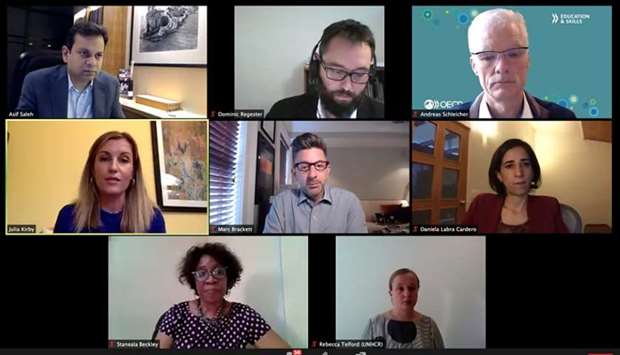Children are not being taught to be "emotionally self-aware" and the world needs to take the opportunity offered by the pandemic to tailor education to individuals, experts have said as Qatar Foundation's global education initiative launched its new e-book detailing experiences from the frontline of learning amid Covid-19.
The Education Disrupted, Education Reimagined special edition e-book developed by the World Innovation Summit for Education (WISE) brings together discussions and shared experiences from the global education community over the course of the five months following the start of the Covid-19 crisis.
The panel, held in partnership with Salzburg Global Seminar and the Diplomatic Courier, saw six education experts who contributed to the e-book and shared their own views on the fundamental changes that need to take place in order to build better education for everyone.
Asef Saleh, executive director of BRAC education programme, which has transformed lives in Bangladesh through education for over 30 years, said, “We are currently dealing with a dire situation for education after the pandemic, which we have never seen since the last World War, where an entire generation might not have an opportunity to resume school.
“We are witnessing massive dropout rates, especially among girls in the developing countries, and while we may recover from this health hazard and economic fallout, recovering from the damage to learning and education will take a much longer time unless we think collaboratively.”
Panelist Rebecca Telford, chief of education at UNHCR, the UN’s refugee agency highlighted the most crucial changes to be addressed in a newly imagined education landscape according to the findings of UN reports on refugees, “Let’s look at how Covid-19 and support from international systems could give us a way to really fast-track the work of inclusion,” she said. “When children around the world are now suffering from the disruption and the developing communities are suffering with poor infrastructure and inaccessibility, this all resonates with the refugees’ situation.
“Now is the opportunity to think of how to tailor education in a way that can benefit everybody, without the need to make parallel systems or special programs that could work for a specific group, and to look at what inclusion means in terms of how the international community tailors support in response to crises.”
Marc Brackett, director, Yale Centre for Emotional Intelligence, said, “At the present time, we don’t have systems that focus on the social and emotional development which is so essential for every human being to be focused and attentive.”
“Imagine how the situation is for a child growing up in abuse, in constant struggle. It impairs their immune function and makes it hard to make sound decisions while being continuously on survival mode. And it makes it so hard for this child to have, and maintain, healthy relationships. We are having a tremendous amount of emotional imbalance in societies, and we need to admit that throwing scattered interventions like a workshop here and there will not solve the issue,” he added.
The panel, held in partnership with Salzburg Global Seminar and the Diplomatic Courier, saw six education experts who contributed to the e-book and shared their own views on the fundamental changes that need to take place in order to build better education for everyone.
Asef Saleh, executive director of BRAC education programme, which has transformed lives in Bangladesh through education for over 30 years, said, “We are currently dealing with a dire situation for education after the pandemic, which we have never seen since the last World War, where an entire generation might not have an opportunity to resume school.
“We are witnessing massive dropout rates, especially among girls in the developing countries, and while we may recover from this health hazard and economic fallout, recovering from the damage to learning and education will take a much longer time unless we think collaboratively.”
Panelist Rebecca Telford, chief of education at UNHCR, the UN’s refugee agency highlighted the most crucial changes to be addressed in a newly imagined education landscape according to the findings of UN reports on refugees, “Let’s look at how Covid-19 and support from international systems could give us a way to really fast-track the work of inclusion,” she said. “When children around the world are now suffering from the disruption and the developing communities are suffering with poor infrastructure and inaccessibility, this all resonates with the refugees’ situation.
“Now is the opportunity to think of how to tailor education in a way that can benefit everybody, without the need to make parallel systems or special programs that could work for a specific group, and to look at what inclusion means in terms of how the international community tailors support in response to crises.”
Marc Brackett, director, Yale Centre for Emotional Intelligence, said, “At the present time, we don’t have systems that focus on the social and emotional development which is so essential for every human being to be focused and attentive.”
“Imagine how the situation is for a child growing up in abuse, in constant struggle. It impairs their immune function and makes it hard to make sound decisions while being continuously on survival mode. And it makes it so hard for this child to have, and maintain, healthy relationships. We are having a tremendous amount of emotional imbalance in societies, and we need to admit that throwing scattered interventions like a workshop here and there will not solve the issue,” he added.

